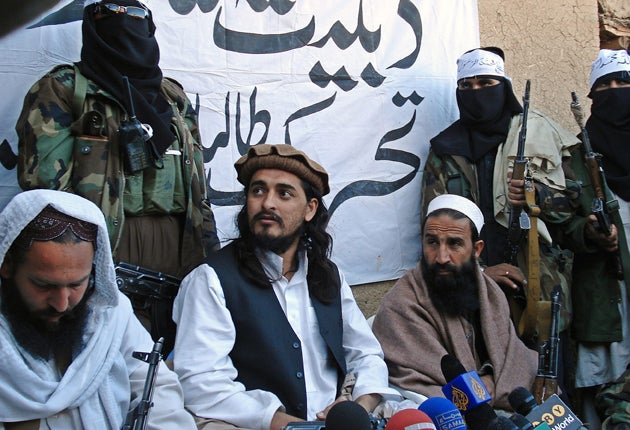Washington hopes to exploit Taliban power struggle
Fierce fighting between rival factions over succession to assassinated Pakistani militant leader casts doubt on movement's survival

Two weeks after the militant leader Baitullah Mehsud was assassinated in a CIA missile strike, the Pakistan Taliban that he once ruthlessly led appears to be in disarray. A violent power-struggle has broken out over naming a successor, and there is even disagreement over whether or not to confirm Mehsud's death.
The fierce fighting between pro-Mehsud and anti-Mehsud militants across the tribal areas and on the edges of Pakistan's North-West Frontier Province has created a situation that analysts say the Pakistan authorities and the US could try to exploit.
Four relatives of Mehsud were detained by the Taliban on suspicion of having tipped off the security forces before the 5 August missile strike in which he and his second wife were apparently killed while staying at his father-in-law's house, it was revealed yesterday. A senior intelligence official told Reuters that Ikramuddin Mehsud, Mehsud's father-in-law, his son, one of his brothers and a nephew had been detained two days ago and were being held in a Mehsud tribe stronghold in the district of South Waziristan. "They are being interrogated by the Taliban in Sararogha," the official said.
The Taliban's suspicions focus on the role of Ikramuddin Mehsud's brother, Saadullah Mehsud, a paramedic who had been called to help treat a stomach problem from which the militant leader had long been suffering. The US missile struck the compound shortly after the medic left.
But the seizing of the relatives is just the latest incident to suggest disarray among the Taliban's various factions, which Mehsud had headed since 2007. Within hours of news of his death emerging, his men mounted attacks on a militant group led by Haji Turkistan Bhittani in the town of Tank.
Clashes between the two groups in Jandola a week later killed 70 people. The Mehsuds burned 30 homes and killed or captured more than a dozen fighters loyal to Mr Bhittani. Mr Bhittani said that with the support of the Pakistani military he had killed 50 militants. Fighting also erupted in Waziristan between the Mehsuds and the rival Wazir tribe.
The clashes, say analysts, are further proof that Mehsud is dead. Previously, the anti-Mehsud groups – which concentrate on fighting across the border in Afghanistan – were either reluctant to challenge the Pakistani Taliban or had non-aggression pacts with its leader.
"There are two levels of infighting," Amir Rana, an expert on Pakistani militancy, said. "First, at the Mehsud level, there is fighting among them for control of the group. The other level is the infighting between the various groups that make up the [Pakistani Taliban]."
This is a situation the Pakistan authorities and the US may be able to exploit in various ways. The Pakistan authorities could, as they have before, identify elements that are prepared to enter into non-aggression deals. The US, however, is opposed to a policy of trying to identify "good" militants as opposed to "bad militants" and would rather the Pakistan military exploited the Taliban's vulnerability by stepping up operations. Yet while the army has been pounding militant positions in Waziristan, it has made it clear that the sort of ground operation that saw troops clear the Taliban from the Swat Valley could, for a variety of reasons, be months away.
One of Mehsud's deputies, Maulvi Faqir, claimed last week that he was temporarily taking control of the Taliban coalition. He insisted that Mehsud was still alive, but was ill, and added that two other senior figures, said to be jockeying for position, had agreed to his ascendancy. Yesterday, however, it was reported that Mr Faqir had now claimed one of those individuals, Hakimullah Mehsud, had subsequently been appointed head of the Taliban coalition.
The question of who ultimately assumes control of the so-called Tehrik-e-Taliban Pakistan has huge implications and will determine whether the Pakistani Taliban continue to focus on fighting within Pakistan, as Mehsud did, or turn west to fight mainly in Afghanistan.
Subscribe to Independent Premium to bookmark this article
Want to bookmark your favourite articles and stories to read or reference later? Start your Independent Premium subscription today.

Join our commenting forum
Join thought-provoking conversations, follow other Independent readers and see their replies